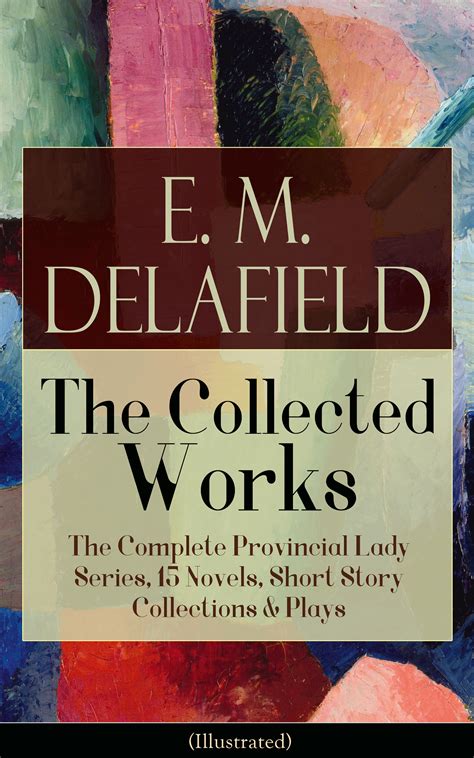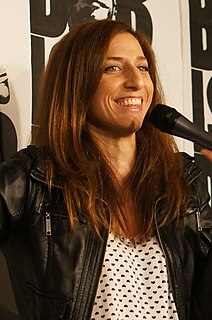A Quote by Seth Grahame-Smith
But if you read Jane Austen, you know that she had a wicked sense of humor. Not only was she funny, but her early writing was very dark and had a gothic tone to it.
Related Quotes
She had lolled about for three years at Girton with the kind of books she could equally have read at home--Jane Austen, Dickens, Conrad, all in the library downstairs, in complete sets. How had that pursuit, reading the novels that others took as their leisure, let her think she was superior to anyone else?
Here was a woman about the year 1800 writing without hate, without bitterness, without fear, without protest, without preaching. That was how Shakespeare wrote, I thought, looking at Antony and Cleopatra; and when people compare Shakespeare and Jane Austen, they may mean that the minds of both had consumed all impediments; and for that reason we do not know Jane Austen and we do not know Shakespeare, and for that reason Jane Austen pervades every word that she wrote, and so does Shakespeare.
She felt a stealing sense of fatigue as she walked; the sparkle had died out of her, and the taste of life was stale on her lips. She hardly knew what she had been seeking, or why the failure to find it had so blotted the light from her sky: she was only aware of a vague sense of failure, of an inner isolation deeper than the loneliness about her.
At that moment a very good thing was happening to her. Four good things had happened to her, in fact, since she came to Misselthwaite Manor. She had felt as if she had understood a robin and that he had understood her; she had run in the wind until her blood had grown warm; she had been healthily hungry for the first time in her life; and she had found out what it was to be sorry for someone.
I am a Jane Austenite, and therefore slightly imbecile about Jane Austen. My fatuous expression, and airs of personal immunity-how ill they sit on the face, say,of a Stevensonian! But Jane Austen is so different. She is my favourite author! I read and reread, the mouth open and the mind closed. Shut up in measureless content, I greet her by the name of most kind hostess, while criticism slumbers.
From an early age she had developed the art of being alone and generally preferred her own company to anyone else’s. She read books at enormous speed and judged them entirely on her ability to remove her from her material surroundings. In almost all the unhappiest days of her life she had been able to escape from her own inner world by living temporarily in someone else’s, and on the two or three occasions that she had been too upset to concentrate she had been desolate.
Jane was my wicked stepmother: she was generous, affectionate and resourceful; she salvaged my schooling and I owe her an unknowable debt for that. One flaw: sometimes, early on, she would tell me things designed to make me think less of my mother, and I would wave her away, saying, 'Jane, this just backfires and makes me think less of you.'
Jane was my wicked stepmother: she was generous, affectionate and resourceful; she salvaged my schooling and I owe her an unknowable debt for that. One flaw: sometimes, early on, she would tell me things designed to make me think less of my mother, and I would wave her away, saying, Jane, this just backfires and makes me think less of you.
I started reading seriously at seven or eight, books about myths and legends, the Narnia series. By the time I was 11, I had read all the children's books in my local library, so I moved on to 'Jane Eyre.' What I loved about Jane Eyre was that she didn't rely on her looks but her character. She had a spirit nobody could break.
When I was in New York, I got to see Joan Rivers do an hour of material, and it blew my mind. I don't remember how old she was at the time, but she just had this edgy hour that had so much funny stuff in it, and she was so fearless. If you only watch her on the red carpet, you don't get a sense of what a legendary standup comedian she is.
She had been so wicked that in all her life she had done only one good deed-given an onion to a beggar. So she went to hell. As she lay in torment she saw the onion, lowered down from heaven by an angel. She caught hold of it. He began to pull her up. The other damned saw what was happening and caught hold of it too. She was indignant and cried, "Let go-it's my onion," and as soon as she said, "my onion," the stalk broke and she fell back into the flames.
I had dinner with Marlene Dietrich in the early 1970s. I went to pick her up and she had someone with her, a dreadful man. He was writing a book about her, and he said to her, 'You're so cold when you perform,' and she said, 'You didn't listen to the voice.' She said the difficulty was to place the voice with the face.
When I walked in on 'Drag Race' and saw Katya, I had no idea she was gonna be funny, because she was stunning. She had this perfect red lip, I remember looking into her eyes and being like, 'This is a woman!' Then she was really funny. She kind of presents normal, and it's a one-two punch with the comedy.
































